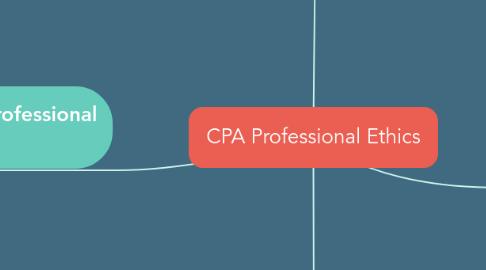
1. AICPA - Code of Professional Conduct
1.1. Designed to provide a framework for expanding professional services and responding to changes in the profession
1.2. Two sections
1.2.1. Principles
1.2.1.1. Responsibilities
1.2.1.2. The Public Interest
1.2.1.3. Integrity
1.2.1.4. Objectivity and Independence
1.2.1.5. Due Care
1.2.1.6. Scope and Nature of Services
1.2.2. Rules
1.3. Additional guidance
1.3.1. Interpretations
1.3.2. Ethics Rulings
1.4. Independence
1.4.1. Independence of mind (actual independence) Independence of appearance Both are required
1.4.2. Threats to independence.
1.4.2.1. CPA financial and other personal matters
1.4.2.1.1. Financial Self-Interest of CPA
1.4.2.1.2. Adverse Interest
1.4.2.1.3. Undue Influence-
1.4.2.2. Interests of relatives and friends
1.4.2.2.1. Familiarity
1.4.2.3. CPA Performance of nonattest services
1.4.2.3.1. Self-Review
1.4.2.3.2. Advocacy of client
1.4.2.3.3. Management Participation
1.4.3. Approaches to evaluate threats to independence.
1.4.3.1. Whether the Code directly addresses the threat
1.4.3.2. If the Code does not directly address the threat, the auditor considers whether adequate safeguards exist to eliminate the threat to independence
1.4.3.3. Chart
2. Ethical Dilemmas
2.1. AICPA Code of Professional Conduct
2.1.1. a mental conflict between differing moral requirements, in which to obey one requirement will result in disobeying another
